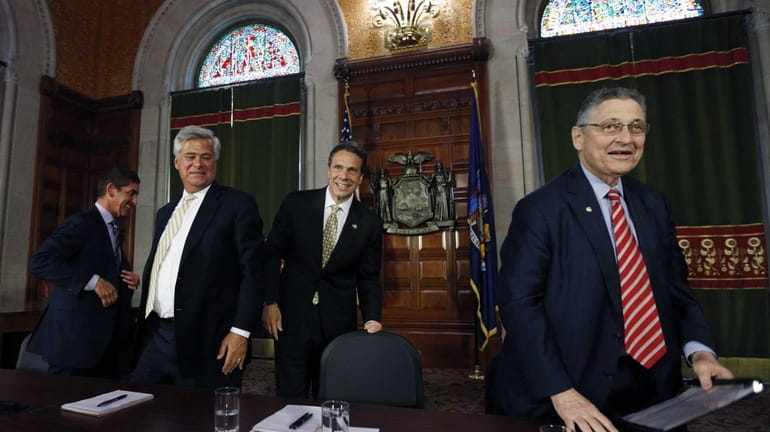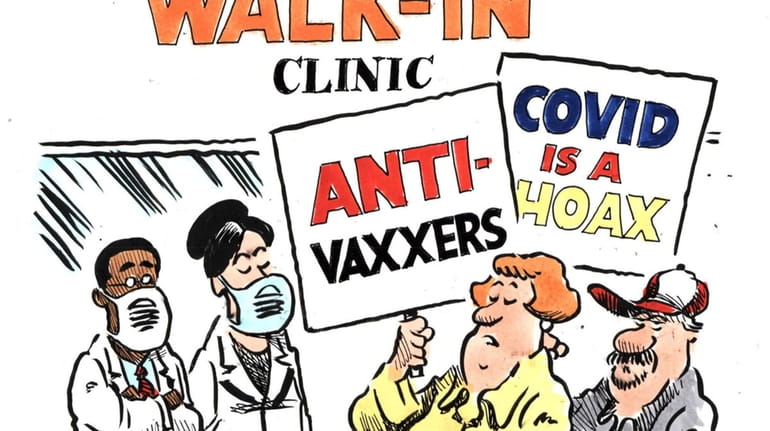Opinion: Anti-heroin legislation doesn't go far enough

(L-R) Senate co-leader Jeff Klein, D-Bronx, Senate Republican leader Dean Skelos, R-Rockville Centre, New York Gov. Andrew Cuomo and Assembly Speaker Sheldon Silver, D-Manhattan, leave a news conference after announcing legislation to combat the rise of heroin use in the state in the Red Room at the Capitol on Wednesday, June 18, 2014, in Albany. Credit: AP / Mike Groll
Those of us on the front lines of Long Island's burgeoning heroin crisis applaud Albany's work on a series of bills to help curb the state's youth opiate problem.
We have grappled with this epidemic on Long Island for a decade. In 2010, the Long Island Council for Alcoholism and Drug Dependence reported 242 deaths from opiates and then 347 just a year later. Thousands of families have been affected; scores of parents have buried children, becoming members of a club no parent ever wants to join.
Hundreds of Long Islanders made trips to Albany in the last two months, including parents of those lost, to tell lawmakers their excruciating tales of insurance company denials of treatment. They also shared their stories in 18 hearings around the state hosted by the Joint Senate Task Force on Heroin and Opioid Addiction. A bipartisan effort, hearings chaired by state Sen. Phil Boyle (R-Bay Shore) played an integral part in passage of legislation that he says will be the beginning of the end for this epidemic.
The legislature and Gov. Andrew M. Cuomo deserve credit for passing and approving the measures. Among other things, they increase the number of state investigators assigned to narcotics teams to work with local police, require insurance companies to better cover substance-abuse treatment, call for public awareness campaigns, harsher penalties for illegal drug distribution and improved access to the drug naloxone, an opiate blocker that immediately reverses an overdose.
But the fight continues. Unfortunately, a few critical items were left on the table as this year's legislative session wound to a close.
Passage of an insurance bill was an enormous victory, but I'm worried that missing provisions have the potential to lead to continued denial of treatment. The measure provides a streamlined appeal process when treatment is denied, but unfortunately, its phraseology might not be enough because the legislation doesn't require insurance companies to cancel out having their own criteria on which to base their coverage. Ideally, the definitions of the term "medical necessity of treatment" should have been standardized so that insurance companies use peer-reviewed clinical criteria approved by the State Office of Alcoholism and Substance Abuse Services when deciding the medical necessity of treatment.
What's more, two critical measures were not addressed. One would require doctors to receive three-hour training biennially on the prescribing of opiates (for too many of our kids, heroin addiction began with a prescription). The other would require oversight and regulation of sober homes. If run properly, these homes can play a critical role in maintaining and enhancing recovery when people phase out of inpatient treatment.
Long Island families and activists will be back in Albany in the fall to fight for the provisions that were discarded at the Capitol.
The package of bills to address the epidemic is a big win. However, with state representatives up for re-election in the fall in both counties, Long Islanders must immediately report any difficulties they encounter when seeking treatment for anyone to the same legislators seeking their votes.
Elected officials must not only be apprised, but also must be held accountable. This must be the beginning of the end.
Maureen Ledden Rossi is the chairwoman of Kings Park In the kNOw, a nonprofit group working to eradicate Long Island's youth opiate/heroin problem.

